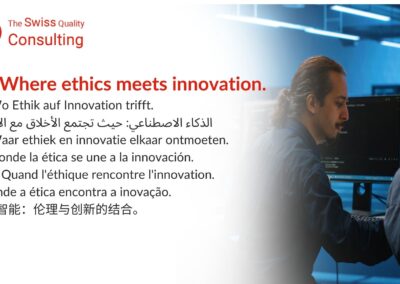Ensuring Ethical Standards in the Age of Digital Transformation
The Principle of Non-Maleficence in Digital Ethics
The principle of non-maleficence in digital ethics is essential for guiding technological advancements and ensuring they do not cause harm. As modern technology continues to evolve, particularly in regions like Saudi Arabia and the UAE, the ethical considerations surrounding its use become increasingly critical. Non-maleficence, a foundational concept in medical ethics, emphasizes the need to prevent harm and minimize negative impacts associated with technological innovations.
In the context of Artificial Intelligence (AI) and other digital technologies, non-maleficence involves careful consideration of potential risks and adverse outcomes. For instance, AI algorithms, while capable of enhancing efficiency and decision-making, can also perpetuate biases and lead to discriminatory practices if not properly managed. Ensuring that AI systems are designed and implemented with ethical oversight is crucial for preventing harm. In cities like Riyadh and Dubai, where AI is rapidly being integrated into various sectors, adopting robust ethical frameworks can help mitigate these risks.
Furthermore, non-maleficence extends to data collection and usage. With the proliferation of digital technologies, vast amounts of personal data are collected and analyzed. Without stringent ethical guidelines, this data can be misused, leading to privacy violations and other harms. Ethical data practices, including informed consent, transparency, and data security, are vital for protecting individuals’ rights. In the UAE, regulatory initiatives aimed at safeguarding data privacy are essential steps toward ensuring that technological advancements do not compromise ethical standards.
Implementing Non-Maleficence in Technological Development
Implementing the principle of non-maleficence in technological development requires a multi-faceted approach involving regulation, education, and continuous evaluation. In Saudi Arabia and the UAE, where technological innovation is a key driver of economic growth, establishing comprehensive ethical frameworks is essential for guiding the responsible development and use of technology.
Regulatory bodies play a crucial role in enforcing non-maleficence in digital ethics. These organizations must establish clear guidelines and standards for the ethical use of technology, including AI, blockchain, and the Metaverse. By setting and enforcing these standards, regulatory bodies can ensure that technological advancements are aligned with ethical principles. For example, in Riyadh, initiatives to develop AI regulations that emphasize transparency, accountability, and fairness are critical for preventing harm and promoting ethical use of technology.
Education and awareness are also vital components of implementing non-maleficence. By promoting digital literacy and ethical awareness among developers, businesses, and the general public, Saudi Arabia and the UAE can foster a culture of ethical technology use. This includes training for developers on ethical coding practices, educating businesses on the ethical implications of technology adoption, and raising public awareness about digital rights and responsibilities. In Dubai, digital literacy programs aimed at young professionals and entrepreneurs are helping to build a foundation of ethical awareness that will guide future technological development.
Continuous evaluation and monitoring are necessary to ensure that ethical guidelines are effective and that emerging technologies do not cause unintended harm. This involves regular audits of AI systems, ongoing assessment of data privacy practices, and the development of mechanisms for reporting and addressing ethical concerns. By adopting a proactive approach to evaluation, Riyadh and Dubai can ensure that their technological advancements are continually aligned with the principle of non-maleficence.
Case Studies: Non-Maleficence in Action in Saudi Arabia and the UAE
Examining case studies from Saudi Arabia and the UAE provides valuable insights into how the principle of non-maleficence is being applied to digital ethics. In Riyadh, the implementation of smart city initiatives offers a prime example of how ethical considerations can guide technological development. These initiatives prioritize data privacy, transparency, and citizen engagement, ensuring that the benefits of smart technologies are realized without compromising ethical standards. By involving citizens in the decision-making process and providing clear information about how data is used, Riyadh is setting a precedent for ethical smart city development.
In Dubai, the healthcare sector is leveraging AI to improve patient outcomes while adhering to the principle of non-maleficence. AI-driven diagnostic tools and personalized treatment plans are enhancing the efficiency and accuracy of healthcare services. However, these advancements are accompanied by strict ethical guidelines that ensure patient data is protected, and AI systems are used responsibly. This approach not only enhances the quality of healthcare but also builds trust between patients and healthcare providers.
Both Saudi Arabia and the UAE are also exploring the use of blockchain technology to enhance transparency and accountability in various sectors. Blockchain’s decentralized and secure nature makes it an ideal tool for ensuring that data is tamper-proof and transactions are transparent. In Riyadh and Dubai, blockchain is being used in applications ranging from supply chain management to financial services, demonstrating its potential to enhance trust and transparency in digital interactions.
The Role of Leadership and Management in Upholding Non-Maleficence
Effective leadership and management are critical for upholding the principle of non-maleficence in digital ethics. Business executives, mid-level managers, and entrepreneurs in Saudi Arabia and the UAE must prioritize ethical considerations in their decision-making processes and foster a culture of ethical awareness within their organizations.
Leadership commitment to ethical principles sets the tone for the entire organization. Executives must demonstrate a commitment to non-maleficence by establishing and enforcing ethical guidelines, providing resources for ethical training, and ensuring that ethical considerations are integrated into all aspects of the business. In Riyadh, forward-thinking leaders are adopting ethical AI practices that emphasize transparency, accountability, and fairness, setting a standard for others to follow.
Mid-level managers play a crucial role in implementing and monitoring ethical practices on a day-to-day basis. They are responsible for ensuring that ethical guidelines are followed, addressing any ethical concerns that arise, and fostering an environment where employees feel empowered to speak up about ethical issues. In Dubai, managers are being trained to recognize and address ethical dilemmas in the use of technology, ensuring that non-maleficence is upheld in all business operations.
Entrepreneurs, particularly those in the tech industry, have a unique opportunity to embed ethical considerations into their startups from the ground up. By prioritizing non-maleficence in their business models and product designs, they can create innovative solutions that benefit society while minimizing harm. In the UAE, entrepreneurial programs that emphasize ethical innovation are helping to cultivate a new generation of tech leaders who are committed to responsible and ethical technological development.
The Future of Non-Maleficence in Digital Ethics
As digital technologies continue to evolve, the principle of non-maleficence will remain a cornerstone of ethical considerations. In regions like Saudi Arabia and the UAE, where technological innovation is rapidly advancing, maintaining a strong commitment to non-maleficence is essential for ensuring that technology serves the greater good without causing harm.
The future of non-maleficence in digital ethics will involve the development of more sophisticated ethical frameworks that can address emerging challenges. This includes creating standards for new technologies such as the Metaverse and Generative Artificial Intelligence, which present unique ethical considerations. By proactively addressing these challenges, Saudi Arabia and the UAE can ensure that technological advancements align with ethical principles and contribute to social and economic development.
In conclusion, the principle of non-maleficence in digital ethics is critical for navigating the challenges posed by modern technology. By implementing robust ethical frameworks, promoting digital literacy, and prioritizing transparency and accountability, Saudi Arabia and the UAE are setting new standards for ethical technology use. These efforts are essential for ensuring that the benefits of digital transformation are realized equitably and responsibly, ultimately contributing to the greater good of society.
#NonMaleficence #DigitalEthics #AI #TechnologicalAdvancements #SaudiArabia #UAE #Riyadh #Dubai #ModernTechnology #BusinessSuccess #Innovation #EthicalTech























